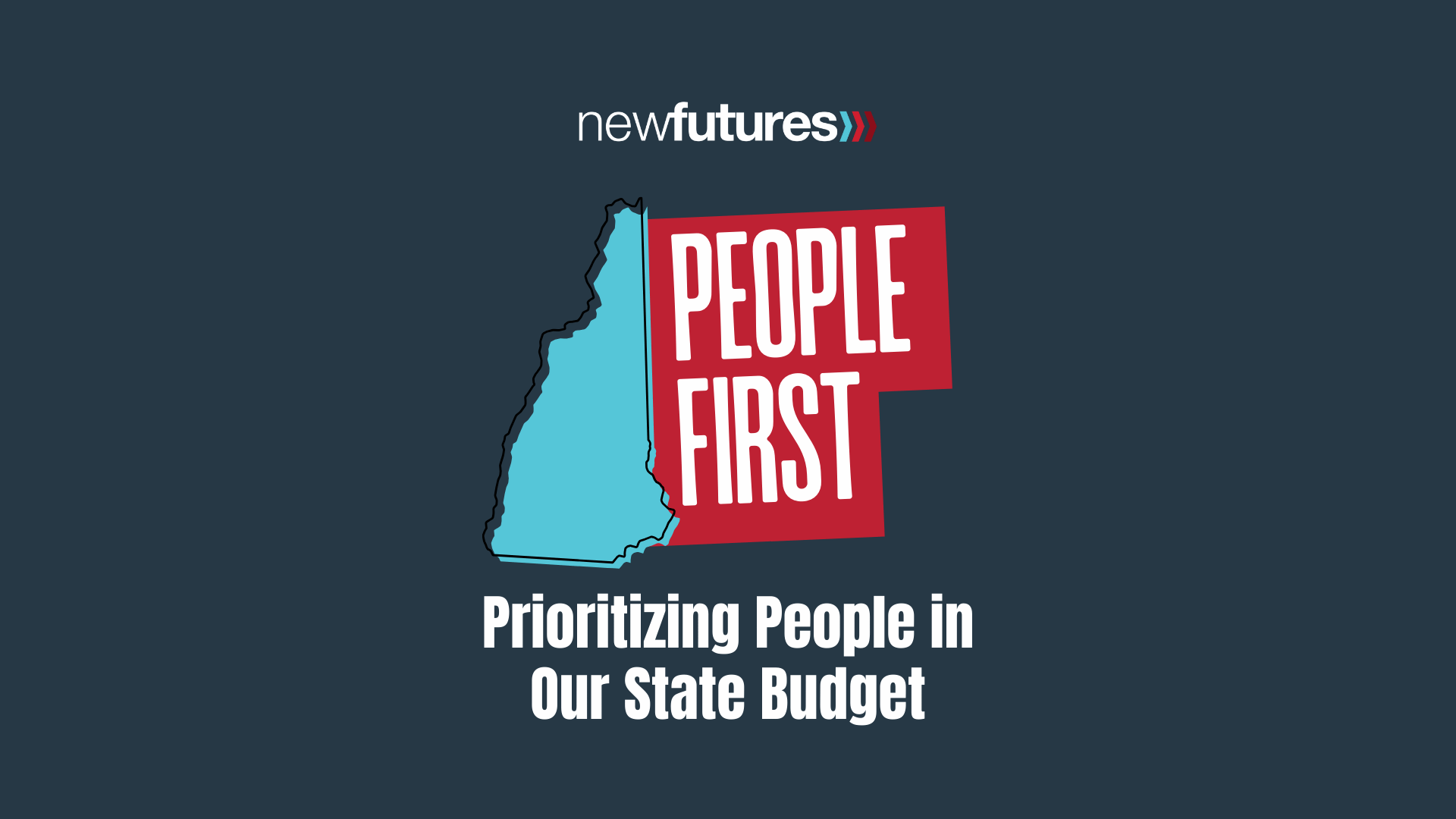Governor Ayotte Signs State Budget: Another Missed Opportunity to Put People First

CONCORD, N.H.-- Earlier today, Governor Kelly Ayotte signed HB 1 and HB 2, New Hampshire’s state budget bills, into law, finalizing a state spending plan that includes some important victories for families and communities but, on the whole, represents another missed opportunity to truly put people first in New Hampshire.
Now enacted in law, the State Budget includes several policy priorities that New Futures advocated for throughout the legislative process, including Momnibus 2.0, expanded access to the Child Care Scholarship Program, and support for home visiting programs, family resource centers and other family support services. These provisions, and others included in the budget, will go into effect on July 1.
Still, the budget also includes many unfortunate pieces, including funding cuts for substance use programs and increased costs for Medicaid recipients, that will create new barriers for Granite Staters in need.
“While we celebrate the important wins in this budget, particularly the Momnibus 2.0 legislation and child care improvements, we cannot ignore the significant missed opportunities and harms to Granite Staters in this budget,” said Michele Merritt, President at New Futures. “Throughout this budget process, we heard from Granite Staters about their need for mental health crisis support, affordable health care, and funding for substance use prevention, treatment, and recovery. The final budget leaves too many of these needs unaddressed.”
The signing of the FY 26-27 budget concludes a legislative process that demonstrated both the power of advocacy and the ongoing challenges of prioritizing human needs. New Futures will continue to monitor the implementation of budget provisions and advocate for the programs and services that help all Granite Staters thrive.
“Every budget cycle presents an opportunity to reflect our values and commitment to supporting all residents,” Merritt continued. “While this budget takes some steps forward, we still have work to do to ensure New Hampshire is a great state to live, work, and raise a family.”
Wins for Granite Staters
Momnibus 2.0 Legislation: The budget incorporates maternal health provisions that improve maternal mental health supports, strengthen workforce protections for parents, expand family supports, and provide maternal health training for rural emergency medical services.
Child Care Access: The inclusion of SB 243 will streamline the New Hampshire Child Care Scholarship Program, making it easier for parents and providers to navigate the system and helping Granite State families have better access to quality, affordable child care.
Family Support Services: The budget provides full funding for home visiting programs and family resource centers, ensuring these critical early intervention services can continue serving communities across the state.
Mental Health Services: The final budget restored full funding for Community Mental Health Centers and related services, preserving critical mental health resources that were at risk during earlier budget negotiations.
Caregiver Support: Additional funding for caregiver respite programming recognizes the vital role of family caregivers and provides much-needed relief for those caring for loved ones.
Missed Opportunities
Despite these wins, the final budget represents several missed opportunities to strengthen New Hampshire residents.
Crisis Prevention: The budget does not provide permanent funding for the 988 Crisis and Suicide Lifeline, leaving New Hampshire without dedicated state support for this critical mental health resource.
Comprehensive Family Support: The budget failed to establish a public-private partnership to fund FAST Forward wraparound services, which provide critical supports and services for children facing mental or behavioral health issues.
Healthcare Access for Older Adults: The budget fails to include funding for Medicaid Savings Plans, which would have helped more older adults access affordable healthcare coverage.
Prescription Drug Costs: The budget eliminates the Prescription Drug Affordability Board, which was New Hampshire’s only dedicated mechanism for addressing high prescription drug costs.
Healthcare System Support: The budget misses an opportunity to increase Medicaid reimbursement rates. While initial negotiations trying to cut reimbursement rates were overturned, flat rates will continue to put a strain on healthcare providers across the state.
Substance Use Services: The budget reduces funding for the Alcohol Fund and jeopardizes the future of the state’s investment in substance use prevention, treatment, and recovery services by removing the Fund’s dedicated funding source from the profits from the state’s liquor stores.
The signed budget also implements policies that may create new barriers for low-wage residents:
Medicaid Work Requirements and Co-Pays: This budget includes funding to implement work requirements and premiums for low-earning Granite Staters on Medicaid—policies that research shows can reduce healthcare access without improving employment outcomes.
The FY 2026-2027 budget will guide state spending through June 2027, when the next budget cycle will begin. New Futures encourages supporters to stay engaged in the political process and continue advocating for policies that put people first.
People First State Budget Priorities
Earlier this session, New Futures identified key priorities for lawmakers to include in the state budget. See where they finished:

